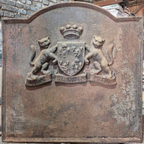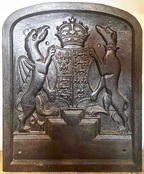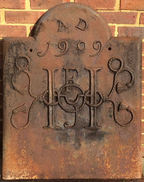-
1324
Description: Arched rectangular shape; cavetto-moulded edging; shield with two cat supporters; above, a baron's coronet; below, a scroll bearing the motto 'Felis Demulcta Mitis'.
Notes: The Brocket barony was created in 1933. The blazon: Quarterly 1st & 4th Argent three salmon haurient Gules in chief an oak tree eradicated Proper (Cain); 2nd & 3rd Per chevron barry of six Gules and Or and of the first in chief two Stags' Heads caboshed proper and in base a Lion rampant guardant of the second (Nall); supporters, two cats guardant erminois. The text of the motto is intaglio.
Inscription: FELIS DEMULCTA MITIS - A stroked cat is gentle
Arms: Nall-Cain, Baron Brocket
- Decoration tags:
- rectangular with round arch (shape)
- cavetto (edging)
- whole carved pattern
- heraldic
- armorial
- text
- animals
- objects
Manufactured: in the 20th century in England.
Current location: not known.
- Attached to series:
- Personal armorial firebacks
-
226
Description: Arched rectangular shaped central panel with bead-and-pellet edging on a wide fillet; central pedestal with a wyvern fountain ringed with water, and a swan and a duck swimming, plants rising from the waves; above, swags of drapery with two central tassels; arched rectangular shaped border with fillet edging, symmetrical floral fronds descending from a rose, top centre, with a looped 'W' in each shoulder; inscription at base, between date; on top, symmetrical scrolled plant tendrils. A single vertical plankline right of centre.
Notes: One of a group of firebacks all of the same date, some of which have the same Welsh inscription which translates as 'God is our strength'. All incorporate the looped 'W' motif which may be intended to identify the pattern maker. The design is taken from 'Livres de Fontaines' by Daniel Marot (1661-1752) (La Haye & Amsterdam 1701). The swan and the duck swimming may have been copied from etchings or paintings by Francis Barlow (c.1624-1709), whose images of birds have been used incidentally on other firebacks. Formerly at Allt-y-ferin, Nantgaredig, Carmarthenshire.
Copies of this fireback are known.
Inscription: 17 DVW Ydyw Ein Cadernid 24
- Decoration tags:
- 'Dutch' (shape)
- fillet (edging)
- whole carved pattern
- planklines
- pictorial
- architectural
- text
- animals
- plants
- objects
Manufactured: in 1724 in England.
Current location: National History Museum, St Fagans, Glamorgan, Wales.
Museum number: 62.156 (part of the Welsh National History Museum museum group)
- Attached to series:
- 1724 series
- Welsh inscription series
- British 'Dutch' style firebacks
-
604
Description: Arched rectangular with curved shoulders; cavetto-moulded edging (top and sides) with twin scrolls on inside corners, and scalloped bottom edge; armorial; shield (32 quarters), mantling, supporters (bull and crowned lion), coronet, motto, 2 helms and crests (a bear’s head erased and ducally gorged, and a bear and ragged staff).
Notes: The impaled arms appear to be those of the Earldom of Huntingdon. The crests are of Hastings and Dudley, suggesting they are of Henry, 3rd Earl (c.1535-95), and his wife, Katherine (1548-1620), daughter of John Dudley, Duke of Northumberland. She was a child when they married in 1553. This is an incomplete casting, the full version of which includes a bottom panel with a repeated guilloche design. Christie's Masters and Makers Sale, South Kensington, 30 Nov 2010, lot 516 (£4,375).
Copies of this fireback are known.
Inscription: IN VERITATE VICTORIA (illegible, but verified on other castings)
Arms: Hastings, earl of Huntingdon, impaling Dudley
- Decoration tags:
- rectangular with round arch (shape)
- cavetto (edging)
- whole carved pattern
- armorial
Manufactured: in the late-16th century in England.
Current location: not known.
- Attached to series:
- Personal armorial firebacks
-
1286
Description: Low-arched shape within broad fillet edging; on a plain field a Tudor royal shield, quarterly France Modern and England, supported by a stylised dragon and greyhound and surmounted by a crown, all resting on a two-stepped compartment with cavetto- and astragal-moulded edging at the top.
Notes: Pastiche 'Tudor' design by George Shaw of Saddleworth, Lancashire, c.1850, possibly intended to be passed off as genuine Tudor. Another casting in this form is to be found in The Guildhall, Lichfield. More decorated examples exist, with a leaf pattern on the edging and 'scales' on the dragon. Firebacks of the same armorial design within a different, arched rectangular, edging are known.
Copies of this fireback are known.
Arms: Tudor royal
- Decoration tags:
- rounded arched (shape)
- fillet (edging)
- whole carved pattern
- heraldic
- armorial
- royal
Manufactured: in the mid-19th century possibly in the Lancashire area of England.
Current location: not known.
- Attached to series:
- George Shaw series
- Tudor royal armorial firebacks
-
982
Description: Arched rectangular shape with demi-bullnose edging (top and sides); 'AD' curved in arch, with straight date below; central letter 'H' in the form of a horse's bit, with initials 'F' and 'J' respectively above and below; two lengths of rope with tasselled ends looped and tied symmetrically around the 'H' and on each side.
Notes: A finely moulded personal fireback with an equestrian connection.
Inscription: AD / 1909 / HFJ
- Decoration tags:
- rectangular with round arch (shape)
- demi-bullnose (edging)
- whole carved pattern
- monogram
- text
- objects
Manufactured: in 1909 in England.
Current location: not known.
- Attached to series:
- Personal firebacks
- Miscellaneous stamp firebacks




